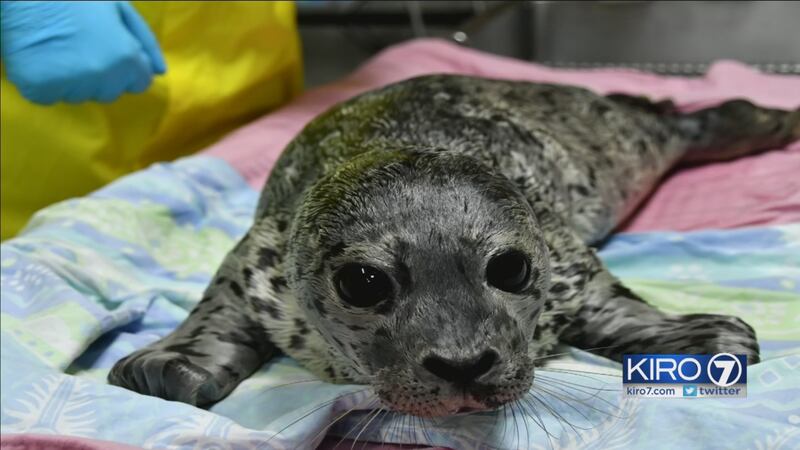LYNNWOOD, Wash. — They look so cute and so tempting to touch, but the harbor seal pups you see on our Washington beaches aren’t for petting and they don’t need your help; in fact, your help can hurt or worse—even kill.
“This is pretty common; we see it all the time. Every year, we get these orphaned animals in that have had some sort of human disturbance,” explained Jeff Brown, a wildlife naturalist at PAWS in Lynnwood.
Staff there say what’s far less common is what happened to a little seal transported to PAWS in mid-June at only a few days old.
A man spotted him on the beach in Ocean Shores, picked him up, took the animal back to his hotel room, and called for help later that night.
“[This seal] did come in with some injuries and he did have some metabolic imbalances because of probably being away from mom for so long and being in the hotel room where he couldn’t get the nourishment he needed. So he is lucky that he pulled through,” explained Dr. Nicki Rosenhagen, a PAWS veterinarian who worked to rehabilitate the seal.
Other seals who faced human interference haven’t been as lucky; a pup had to be euthanized after someone used a shopping bag to carry it off a beach in Westport two years ago.
Last summer people crowded around a pup in Edmonds until Seal Sitters—volunteers trained to monitor the condition of our local seal pups—intervened. They tag the animals and often put a barrier around them to minimize disturbances.
“When a seal is hauled out, or comes out of the water, it may look orphaned but it can be there for up to 24 hours without seeing mom so that’s when we have those issues, when people think it’s been orphaned but it’s not,” Brown told us.
Your touch, however, is what could cause the mother to abandon her pup.
So you’re welcome to take in the view from afar, and maybe you’ll even see PAWS’ success story swimming around Grays Harbor; he’ll be released Tuesday.
“We’re really excited. It was a little touch-and-go in the beginning—he had some wounds over his back and those metabolic imbalances that were concerning. But after a couple of weeks in care he hit his stride and took off and has been putting on weight and eating really well so, yeah, we’re excited,” Rosenhagen said.
Experts say you should always stay at least 100 yards away from a seal on the beach, keep your dogs on a leash, and call NOAA at (866) 767-6114 if you are concerned the animal is in distress.
More news from KIRO 7
- Amazon hiring more than 200 work-from-home positions
- Once again, Thurston County Jehovah's Witnesses hall targeted in attack
- Police: 5-year-old girl reportedly touched by stranger in restroom at Edmonds park
- Oregon K-9 saved by Narcan after exposure to contraband heroin in jail
- Do you have an investigative story tip? Send us an email at investigate@kiro7.com
Cox Media Group








